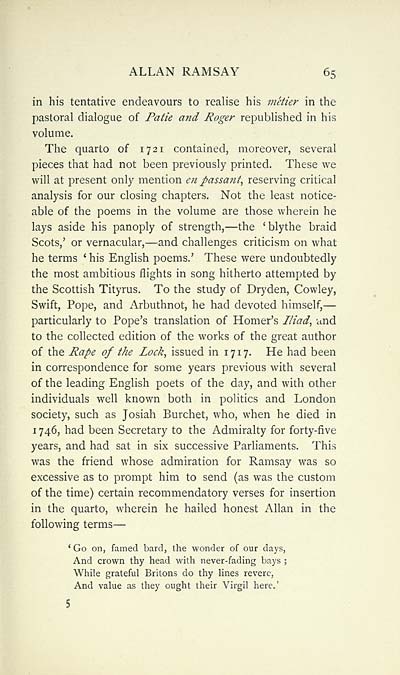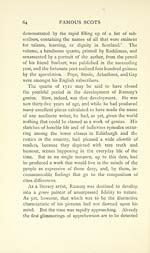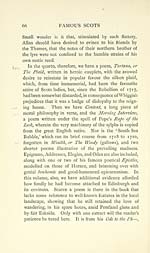Glen Collection of printed music > Printed text > Allan Ramsay
(69) Page 65
Download files
Complete book:
Individual page:
Thumbnail gallery: Grid view | List view

ALLAN RAMSAY 65
in his tentative endeavours to realise his metier in the
pastoral dialogue of Patie and Roger republished in his
volume.
The quarto of 1721 contained, moreover, several
pieces that had not been previously printed. These we
will at present only mention en passant^ reserving critical
analysis for our closing chapters. Not the least notice-
able of the poems in the volume are those wherein he
lays aside his panoply of strength, — the 'blythe braid
Scots,' or vernacular, — and challenges criticism on what
he terms 'his English poems.' These were undoubtedly
the most ambitious flights in song hitherto attempted by
the Scottish Tityrus. To the study of Dryden, Cowley,
Swift, Pope, and Arbuthnot, he had devoted himself, —
particularly to Pope's translation of Homer's Iliad^ und
to the collected edition of the works of the great author
of the Rape of the Lock, issued in 171 7. He had been
in correspondence for some years previous with several
of the leading English poets of the day, and with other
individuals well known both in politics and London
society, such as Josiah Burchet, who, when he died in
1 746, had been Secretary to the Admiralty for forty-five
years, and had sat in six successive Parliaments. This
was the friend whose admiration for Ramsay was so
excessive as to prompt him to send (as was the custom
of the time) certain recommendatory verses for insertion
in the quarto, wherein he hailed honest Allan in the
following terms —
' Go on, famed bard, the wonder of our days,
And crown thy head with never-fading bays ;
While grateful Britons do thy Hnes revere,
And value as they ought their Virgil here.'
5
in his tentative endeavours to realise his metier in the
pastoral dialogue of Patie and Roger republished in his
volume.
The quarto of 1721 contained, moreover, several
pieces that had not been previously printed. These we
will at present only mention en passant^ reserving critical
analysis for our closing chapters. Not the least notice-
able of the poems in the volume are those wherein he
lays aside his panoply of strength, — the 'blythe braid
Scots,' or vernacular, — and challenges criticism on what
he terms 'his English poems.' These were undoubtedly
the most ambitious flights in song hitherto attempted by
the Scottish Tityrus. To the study of Dryden, Cowley,
Swift, Pope, and Arbuthnot, he had devoted himself, —
particularly to Pope's translation of Homer's Iliad^ und
to the collected edition of the works of the great author
of the Rape of the Lock, issued in 171 7. He had been
in correspondence for some years previous with several
of the leading English poets of the day, and with other
individuals well known both in politics and London
society, such as Josiah Burchet, who, when he died in
1 746, had been Secretary to the Admiralty for forty-five
years, and had sat in six successive Parliaments. This
was the friend whose admiration for Ramsay was so
excessive as to prompt him to send (as was the custom
of the time) certain recommendatory verses for insertion
in the quarto, wherein he hailed honest Allan in the
following terms —
' Go on, famed bard, the wonder of our days,
And crown thy head with never-fading bays ;
While grateful Britons do thy Hnes revere,
And value as they ought their Virgil here.'
5
Set display mode to: Large image | Transcription
Images and transcriptions on this page, including medium image downloads, may be used under the Creative Commons Attribution 4.0 International Licence unless otherwise stated. ![]()
| Special collections of printed music > Glen Collection of printed music > Printed text > Allan Ramsay > (69) Page 65 |
|---|
| Permanent URL | https://digital.nls.uk/91279114 |
|---|
| Description | Scottish songs and music of the 18th and early 19th centuries, including music for the Highland bagpipe. These are selected items from the collection of John Glen (1833 to 1904). Also includes a few manuscripts, some treatises, and other books on the subject. |
|---|
| Description | The Glen Collection and the Inglis Collection represent mainly 18th and 19th century Scottish music, including Scottish songs. The collections of Berlioz and Verdi collected by bibliographer Cecil Hopkinson contain contemporary and later editions of the works of the two composers Berlioz and Verdi. |
|---|

